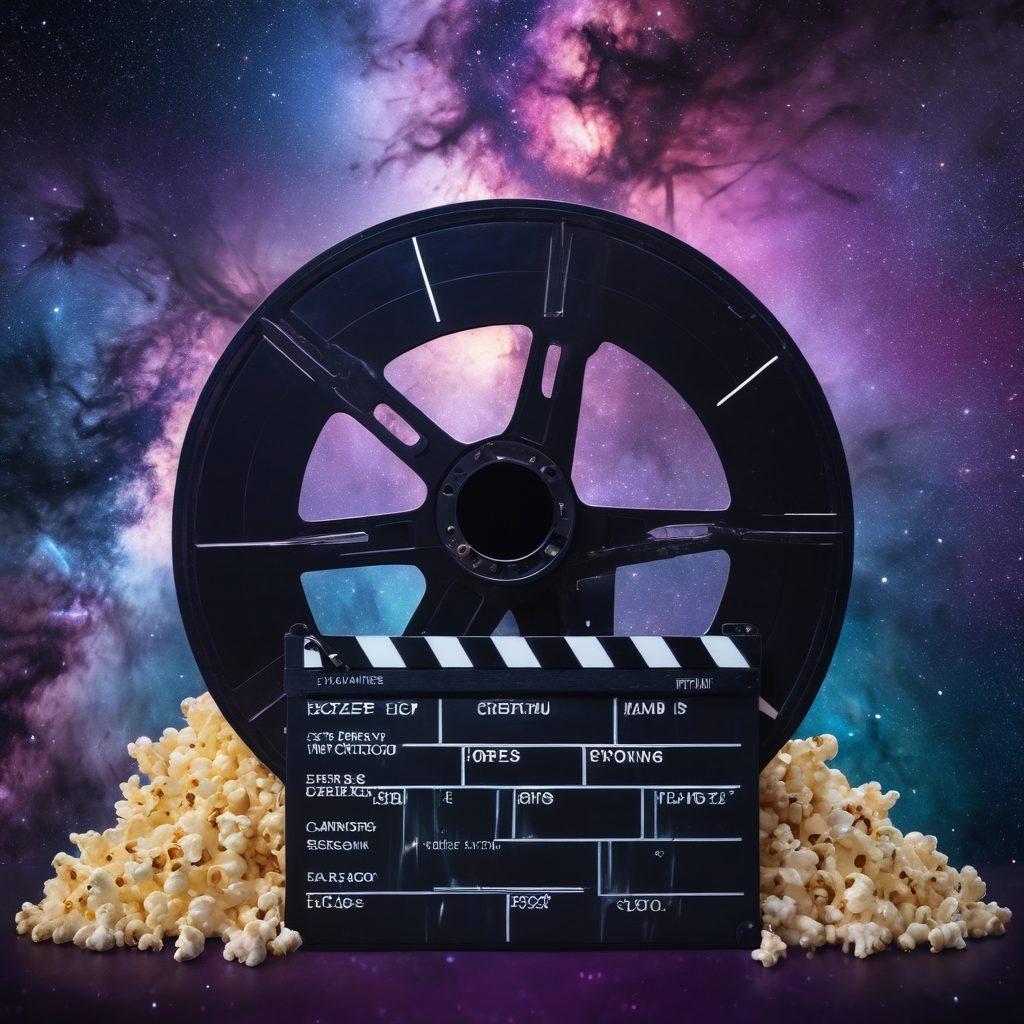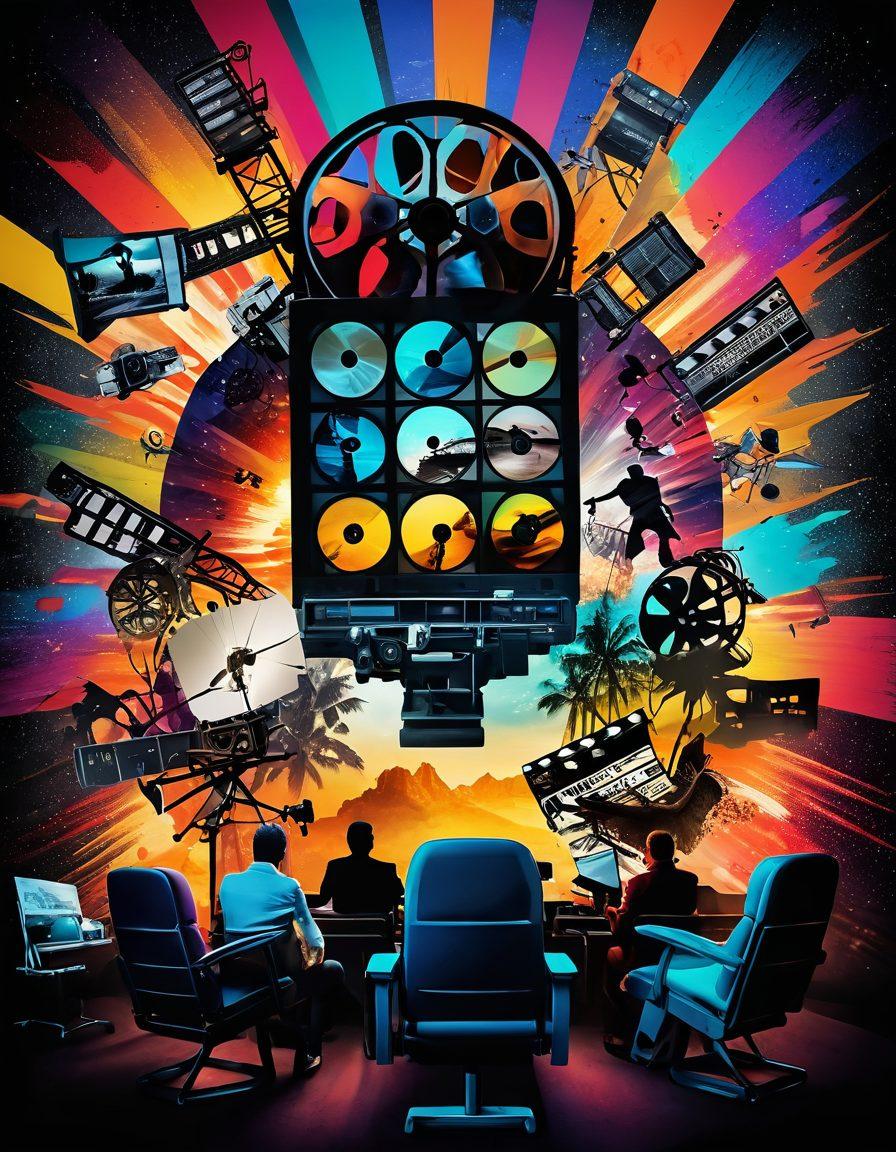Exploring the Cinematic Universe: A Deep Dive into Film Reviews and Industry Insights
Have you ever watched a film and found yourself completely immersed in its world, feeling the ups and downs of the characters as if they were your own? The magic of cinema has a way of transporting us to different places and times, while revealing profound truths about the human experience. In today's blog, we'll delve deep into the enchanting realm of film reviews and audience engagement, exploring how we connect with the stories told on screen and how these cinematic experiences shape our perspectives. From gripping documentaries to thrill-inducing genre films, the film industry never ceases to amaze us. So, grab your popcorn, as we unveil the intricate connection between film reviews and audience engagement.
Film reviews play a vital role in guiding viewers through the vast ocean of films available in today's movie streaming landscape. Think about it: how often do you find yourself scrolling through endless titles in hopes of discovering something that will captivate your attention? A well-crafted film critique serves as a beacon, helping audiences navigate their choices with meaningful insights about storylines, characters, and visual storytelling. An excellent film review captures the essence of what makes a motion picture worth watching, but it also reflects the thoughts, emotions, and expectations of the audience. After all, everyone loves a good, solid movie guide!
Have you ever wondered why some films become iconic while others may fade into obscurity? It often comes down to how effectively a film resonates with its audience. With a plethora of film festivals showcasing independent films and documentaries, it's no surprise that film ratings and critiques from renowned critics shape perceptions. When watching the director's cut, viewers are privy to a deeper understanding of the filmmaker's vision, and this insight can greatly influence the film's box office performance. Therefore, as audience engagement softens the boundaries between filmmakers and viewers, it sparks conversations that can elevate the film industry as a whole. What conversations have influenced your take on recent feature films?
Visual storytelling is the heart and soul of cinema. From the crafty screenplays to the compelling performances of actors, it is a symbiotic relationship that brings motion pictures to life. Engaging with the talents behind the scenes, such as producers and directors, helps us gain a more profound appreciation for the intricate process of film production and distribution. Diving into the filmography of our favorite directors can lead to discovering hidden gems --- those lesser-known independent films that challenge the norm or give voice to untold stories. And who knows? You may end up witnessing the emergence of future film awards winners among those films!
As we explore the evolving landscape of cinematic arts, we find ourselves at the intersection of technology and storytelling. The rise of movie trailers and digital promotions has transformed how audiences anticipate forthcoming films. We now live in a world where film news and insights are just a click away, and social media platforms keep the conversation going. It begs the question: how will future generations engage with cinema? Will they prefer international cinema, or are traditional feature films still the backbone of the film industry? Whatever the outcome, engaging with film critiques not only empowers the audience but also fosters an appreciation for the countless hours of creativity spent on every screen we watch. So, tell me, what film has left an indelible mark on your heart, and why? Let's celebrate the magic of cinematic storytelling together!
Behind the Lens: Understanding the Film Industry’s Trends and Innovations
The film industry is a vibrant tapestry woven with creativity, innovation, and camaraderie among storytellers. As we step Behind the Lens, it becomes clear that understanding the trends and innovations within this realm is crucial for cinephiles and industry professionals alike. Have you ever wondered how your favorite films go from a script to stunning cinematic experiences? Or what new technologies are reshaping the way stories are told in movies? Join us as we dive into the ever-evolving world of film, exploring its intricacies reveal the magic that unfolds behind the scenes.
One of the most exciting trends in the film industry today is the rise of movie streaming platforms. Gone are the days when audiences were confined to theater seats to enjoy feature films; now, films can be accessed at the click of a button from the comfort of your home. This shift has democratized cinema, allowing countless independent films and documentaries to reach wider audiences. Can you think of a time when a movie streaming service introduced you to a film you’d probably never have seen in theaters?
Moreover, as movies flood our screens—whether on streaming services or at film festivals—understanding film critiques and ratings has become essential. The buzz around certain films can set the box office on fire, while others might fade quietly into obscurity. A key part of this process is the amalgamation of audience engagement and film reviews. Have you ever been influenced by a captivating movie trailer or a thought-provoking film review? These elements spark conversations and shape our perceptions of motion pictures, making film analysis a discourse filled with passion and excitement.
Technology also plays a pivotal role in shaping trends, and it’s fascinating to see how innovations have transformed visual storytelling. From high-definition cinematography to the advent of virtual reality films, directors and producers push the boundaries of creativity. Imagine a world where audiences can experience a movie as if they are part of it—what kind of genres do you think would benefit from such immersive experiences? As filmmakers harness these technologies, the distinction between traditional cinema and the cutting-edge becomes increasingly blurred.
As we explore film industry trends, it's crucial to keep an eye on up-and-coming directors and their creative endeavors. The nuanced art of storytelling through screenplays, independent films, and genre films yields stunning work that deserves recognition. Film festivals and film awards showcase these talents, often culminating in spectacular moments that leave audiences inspired. Have you ever discovered a filmmaker through a film festival that changed your perspective on the cinematic arts? In seeing these movies, we often unlock new narratives that shape our understanding of what it means to be human. With each viewing, film becomes a world to explore, a mystery to unravel, and a conversation to ignite—so let's keep the dialogue going about the art of filmmaking and the stories that connect us all.
From Script to Screen: A Journey through Cinematic Experiences and Film Critiques
Diving into the world of cinema is akin to traversing a vibrant universe where the tales come alive, and every frame tells a story. The journey from script to screen is not merely a technical process; it's an evocative experience that shapes our understanding of humanity. How often have we left a theater, our hearts racing and minds swirling, all thanks to the creative genius behind a film? Whether it’s an independent film that resonates with our emotions or a blockbuster that steals the box office spotlight, the cinematic arts hold a mirror to our existence, sparking debates, insights, and reactions that linger long after the credits roll.
At the heart of this magical journey lies the screenplay. A screenplay is not just a script; it's the lifeblood of movies and a testament to a writer's imagination. By examining various film reviews, one can appreciate how essential a well-crafted screenplay is to delivering cinematic experiences. Think about it: how many times have you gripped the edge of your seat during a film because the plot twist was laid out so perfectly by the writer? Films that emerge from strong screenplays frequently garner film awards and resonate with audiences, a testament to their profound storytelling.
Of course, film production and direction are equally pivotal. As we create our movie guides to understanding cinematic experiences, we must recognize how directors shape the narrative. Their unique visions bring a screenplay to life, transforming mere words into motion pictures that spark joy, sadness, or even terror. Imagine the stories we’ve seen unfold through feature films and documentaries, where cinematography and visual storytelling entwine to create lasting impressions. Directors like Quentin Tarantino and Ava DuVernay show how a director's cut can sometimes reveal layers of meaning not present in the original release, inviting deeper film analysis and engagement.
Moreover, film critiques play an important role in shaping perceptions. While some films may soar with audiences, others might falter in the harsh light of film ratings. But isn't that part of the beauty of cinema? Every viewer brings their own experiences, context, and preferences; thus, films can be both universally loved and heavily dissected. Discussions about independent films and genre films provide a rich tapestry of perspectives, showcasing how the film industry can encompass a diverse range of narratives. With streaming services at our fingertips, discovering a hidden gem has never been easier – this increased accessibility can be a double-edged sword, creating a saturation of content while also fostering a new audience engagement.
Finally, as we reflect on the evolution of cinema, one cannot overlook film news and the burgeoning landscape of film festivals. These events provide platforms for the entire filmography of filmmakers, from emerging talent to established veterans. They also serve as a launchpad for upcoming movie trailers that leave audiences buzzing with excitement. As we delve into the impact of film distribution and marketing strategies, it becomes evident that the cinematic universe is more than just entertainment; it's a culture, a dialogue, and an ongoing exploration of what it means to tell stories. So, what’s the next film that will touch your soul or change your perception? The journey through cinema is never truly over; it evolves as we do.


